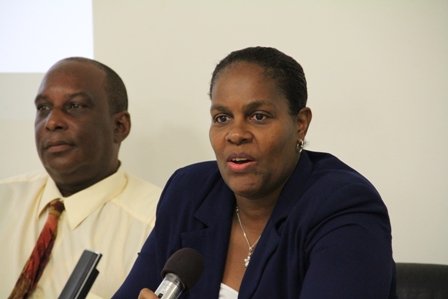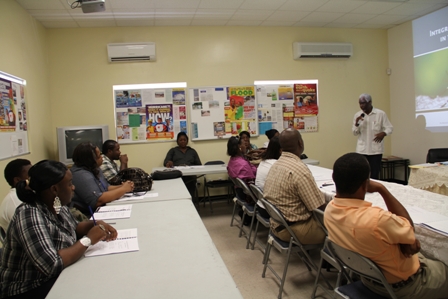Public Health Practioners on St. Kitts and Nevis sharpen skills on integrated vector management

(L-R) Chief Environmental Health Officer on St. Kitts Mr. Elton Morton and Chief Medical Officer on Nevis Dr. Judy Nisbett
NIA-CHARLESTOWN NEVIS (November 07, 2011) — Public Health practitioners in Nevis and St. Kitts have been afforded an opportunity by the Pan American Health Organizantion (PAHO) in association with the Ministry of Health on St. Kitts and Nevis to contribute to a manual on Integrated Vector Management for the Federation from November 7-9th 2011.
On completion, the handbook which was compiled by the workshop’s facilitator Emeritus Scientist with the Caribbean Epidimiology Centre/PAHO Dr. Samuel C. Rawlins PhD will be used as a guideline for Public Health Officers to carry out their duties.
During the Workshop’s opening ceremony at the Llewelyn Newton Disaster Management’s conference room at Long Point, Medical Officer on Nevis Dr. Judy Nisbett told the participants that the manual would become their bible at the end of the training. She described the workshop as an excellent opportunity for them to gain knowledge.
“This workshop is an excellent opportunity for you to learn new material and new skills and to sharpen those you already have. In fact this workshop comes at an opportune time.
“As you know we have been seeing an increase in the number of dengue fever cases over the past few weeks. The Aegypti Moisquito which is the vector for the dengue virus is of course just one of the many vectors that we need to be concerned about and Dengue Fever is just one of the many vector borne diseases we need to be concerned about,” she said.
While Dr. Nisbett underscored the importance of the job of Public Health Officers, she encouraged them to pay very close attention throughout the workshop and to put all the new knowledge and skill that they would acquire during the workshop into practice in their daily work as they strived to control vector bourne diseases in the Federation.

Meantime, Chief Environmental Health Officer in St. Kitts Mr. Elton Morton in remarks stated that the Vector Controll Programme in St. Kitts and Nevis faced many challenges among them limited staff and resources and a lack of motivation for some officers to carry out their daily activities.
However, he expressed hope that the manual would assist the situation.
“It is my hope that by implimenting the use of this manual, it should go a long way in correcting some of the difficulties/inefficiencies that we are presently experiencing in the Vector Controll Programme in St. Kitts and Nevis.
Mr. Morton noted that a number of recommendations had been put froward by Dr. Rawlings following an asssessment and that the implimentation of the working manual for vector control officers was just one of the many such recommendations for the improvement of the Vector Control Programme in St. Kitts and Nevis.
He said he was assured that at the end of the workshop the participants would be left reenergised and motivated to carry out the activities of the Vector Controll Programme in St. Kitts and Nevis in a meaningful way.
